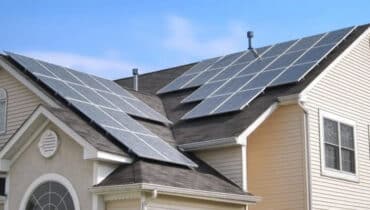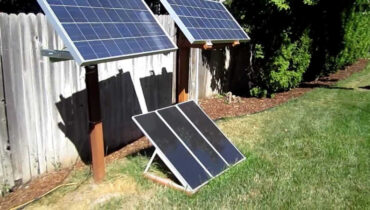Table of Contents
This is the main heading that introduces the topic of the article. It sets the stage for exploring the possibility of off-grid living with solar panels. In an era marked by increasing concern for sustainability and self-sufficiency, the idea of living off the grid with solar panels has gained significant attention, prompting individuals to inquire about factors such as how long do solar panels last for a sustainable and reliable energy solution. This article explores the possibilities and challenges of embracing off-grid living powered by solar energy.
In a world increasingly driven by sustainability and self-sufficiency, the idea of living off the grid with solar panels has emerged as an intriguing and environmentally conscious lifestyle choice. As concerns about climate change and energy independence continue to grow, so does the interest in harnessing the power of the sun to fuel our homes and lives.
In this comprehensive guide, we will explore the possibilities and intricacies of off-grid living powered by solar panels. We will journey through the fundamental concepts of off-grid living, the pivotal role solar panels play, and the practical aspects of designing and sustaining an off-grid solar system. From understanding the motivations behind this lifestyle choice to addressing the challenges it presents, In our exploration, we aim to provide you with a well-rounded perspective on whether off-grid living with solar panels is a feasible and fulfilling path for you, considering various aspects, including how long do solar panels last on average, to help you make informed decisions about sustainable energy solutions.
Understanding Off-Grid Living
Off-grid living represents a lifestyle choice centered around self-reliance and independence from conventional utility services. It involves disconnecting from the electrical grid, water supply, and sewage systems that most people rely on in urban and suburban areas. In the pursuit of off-grid living, individuals often inquire about essential considerations, such as what should be the tilt angle for solar panels, to maximize energy absorption and enhance overall system efficiency. Instead, off-grid dwellers seek to meet their energy, water, and waste management needs through sustainable, often eco-friendly means.
Ultimately, understanding off-grid living means embracing a holistic approach to sustainable living that prioritizes self-sufficiency, environmental responsibility, and a conscious effort to reduce one’s impact on the planet. It’s a lifestyle choice that requires careful planning, adaptation, and a deep commitment to harmonizing with nature while enjoying the benefits of greater autonomy and reduced environmental impact.
What Does It Mean to Live Off-Grid?
Living off-grid essentially means disconnecting from traditional utility services such as electricity, water, and sewage systems. It’s a lifestyle choice that promotes self-reliance and reduces environmental impact. In this section, we delve into the concept of living off-grid, explaining what it entails. It’s a gentle introduction to the idea of disconnecting from traditional utilities.
Why Choose Off-Grid Living?
People opt for off-grid living for various reasons, including reducing their carbon footprint, gaining energy independence, and escaping the constraints of urban life. This subsection explores the motivations behind choosing an off-grid lifestyle, providing insight into the reasons people opt for this alternative way of living, including considerations such as how long do solar panels last on a house, contributing to the sustainability and longevity of their chosen energy solution.
Best Off-Grid Solar Living Kits
When it comes to venturing into off-grid living, selecting the right solar kit can make all the difference. These comprehensive packages come with everything you need to harness the power of the sun and achieve energy independence. In this section, we’ll explore some of the best off-grid solar kits available, offering you a glimpse into the top choices for your sustainable and self-reliant lifestyle.
Renogy
Renogy is a well-established name in the world of off-grid solar solutions. Their kits are renowned for their quality and reliability. Renogy offers a range of options suitable for various needs, from small-scale setups for camping and RVs to larger systems for homes and cabins. With easy-to-follow instructions and top-tier components, Renogy provides an excellent starting point for anyone looking to embrace off-grid living with confidence.
WindyNation
WindyNation is another prominent player in the off-grid solar kit market. They are known for their comprehensive kits that cater to a wide range of energy requirements. These kits often include not only solar panels and charge controllers but also inverters and mounting hardware. WindyNation’s kits are designed with simplicity and efficiency in mind, making them an excellent choice for those new to off-grid living. The consideration of what is the optimal direction for solar panels is integrated into their design, ensuring users can harness maximum sunlight exposure for enhanced energy production.
ECO-WORTHY
ECO-WORTHY specializes in providing sustainable energy solutions, including a variety of off-grid solar kits. What sets them apart is their commitment to affordability without compromising on quality. ECO-WORTHY offers kits suitable for both small-scale and larger off-grid applications. Their products are known for their durability, making them a practical choice for those looking for long-term energy independence without breaking the bank.
These are just a few of the best off-grid solar kit options available, each with its own unique strengths and suitability for different off-grid living scenarios. By choosing the right kit that aligns with your energy needs and goals, you can embark on your journey toward sustainable and self-sufficient living with confidence.
The Role of Solar Panels in Off-Grid Living
How Do Solar Panels Work?
Solar panels harness the power of the sun through photovoltaic cells, converting sunlight into electricity. This renewable energy source is central to off-grid living, prompting individuals to assess factors such as which is better series or parallel solar panels, to optimize energy production and meet the unique demands of self-sustainable lifestyles. Here, we gently explain the basic functioning of solar panels, highlighting their role as the primary energy source for off-grid living.
The Advantages of Solar Panels for Off-Grid Living
- Renewable Energy Source: Solar energy is abundant and sustainable, making it an ideal choice for off-grid living.
- Energy Independence: Off-grid dwellers can generate their own electricity, reducing dependence on centralized power grids.
- Reduced Operating Costs: Solar panels can significantly lower long-term energy costs.
- Environmental Benefits: Solar energy production is clean and produces no greenhouse gas emissions.
The Challenges of Solar Panels for Off-Grid Living
- Initial Costs: Installing a solar panel system can be expensive.
- Limited Energy Storage: Storing excess energy for nighttime or cloudy days can be challenging.
- Maintenance: Solar panels require regular cleaning and maintenance to perform optimally.
Designing an Off-Grid Solar System
Sizing Your Solar System
Determining the right size for your solar system is crucial to meet your energy needs. Factors like location, daily energy consumption, and storage capacity play a role. We provide gentle guidance on determining the appropriate size for a solar system, considering various factors that come into play.
Battery Storage Systems
Batteries are essential for storing excess energy generated during sunny days for use at night or during cloudy periods. Choosing the right battery system is critical. This subsection touches on the importance of batteries in storing excess solar energy for use during periods of low sunlight.
Backup Generators
Many off-grid setups incorporate backup generators to provide power during extended periods of low sunlight or battery failure. We discuss backup generators and their role in ensuring a continuous power supply for off-grid homes, taking a practical approach. Additionally, considerations such as how long do solar panels last in florida are explored to address regional factors and optimize the resilience of sustainable energy systems.
Living Comfortably Off-Grid
Water and Waste Management
Off-grid living involves managing water sources and waste disposal, often through rainwater harvesting and composting toilets, prompting individuals to evaluate factors such as which is better inverter or solar panels, to make informed decisions about their self-sufficient lifestyle. This section gently addresses the essential aspects of managing water sources and waste disposal when living off-grid, focusing on sustainability.
Energy-Efficient Appliances and Practices
Using energy-efficient appliances and adopting eco-friendly practices help maximize the benefits of your off-grid solar system. We explore how adopting energy-efficient appliances and practices can enhance the comfort and efficiency of off-grid living, delving into factors such as does temperature affect solar panel efficiency to ensure a comprehensive understanding of sustainable energy solutions.
Legal and Regulatory Considerations
- Building Codes and Permits: Before embarking on an off-grid journey, it’s crucial to understand local building codes and permitting requirements. This part gently emphasizes the importance of understanding local building codes and permits when planning an off-grid setup.
- Grid Tie-In Options: In some cases, connecting to the grid as a backup option may be necessary or even legally mandated. We discuss grid tie-in options in a way that highlights their relevance and potential requirements, ensuring readers are informed.
The Realities of Off-Grid Living
- Is Off-Grid Living for Everyone: Off-grid living requires significant adjustments and may not be suitable for everyone. Here, we gently explore the idea that off-grid living may not be suitable for everyone, emphasizing the need for careful consideration.
- Community and Resources: Engaging with off-grid communities and accessing relevant resources can make the transition smoother. We highlight the importance of engaging with off-grid communities and accessing resources for support, fostering a sense of connection.
FAQs
Is it expensive to set up an off-grid solar system?
Setting up an off-grid solar system can have significant initial costs, including solar panels, batteries, and inverters. However, it can lead to long-term savings on energy bills.
How long do solar panels last?
Solar panels typically have a lifespan of 25-30 years, but they can continue producing electricity for many years beyond that.
Can I still have modern amenities while living off-grid?
Yes, you can have modern amenities like refrigeration, lighting, and even internet connectivity with the right off-grid setup and energy management.
What happens when there is not enough sunlight?
During periods of limited sunlight, such as cloudy days, your battery storage system or backup generator can provide power to your off-grid home.
Is off-grid living legal everywhere?
The legality of off-grid living varies by location and local regulations. It’s essential to research and understand the legal requirements in your area before going off-grid.
Conclusion
This is the concluding section that summarizes the article, summarizing the key points and encouraging readers to make informed decisions about off-grid living with solar panels. Living off the grid with solar panels is a viable and sustainable lifestyle choice. It offers energy independence, environmental benefits, and a chance to reduce one’s carbon footprint. However, it comes with its unique challenges and considerations.
Before taking the plunge, carefully assess your needs, resources, and commitment to this lifestyle to determine if it’s the right path for you. With proper planning and a strong commitment to sustainability, off-grid living powered by solar panels can be a rewarding and fulfilling choice.

